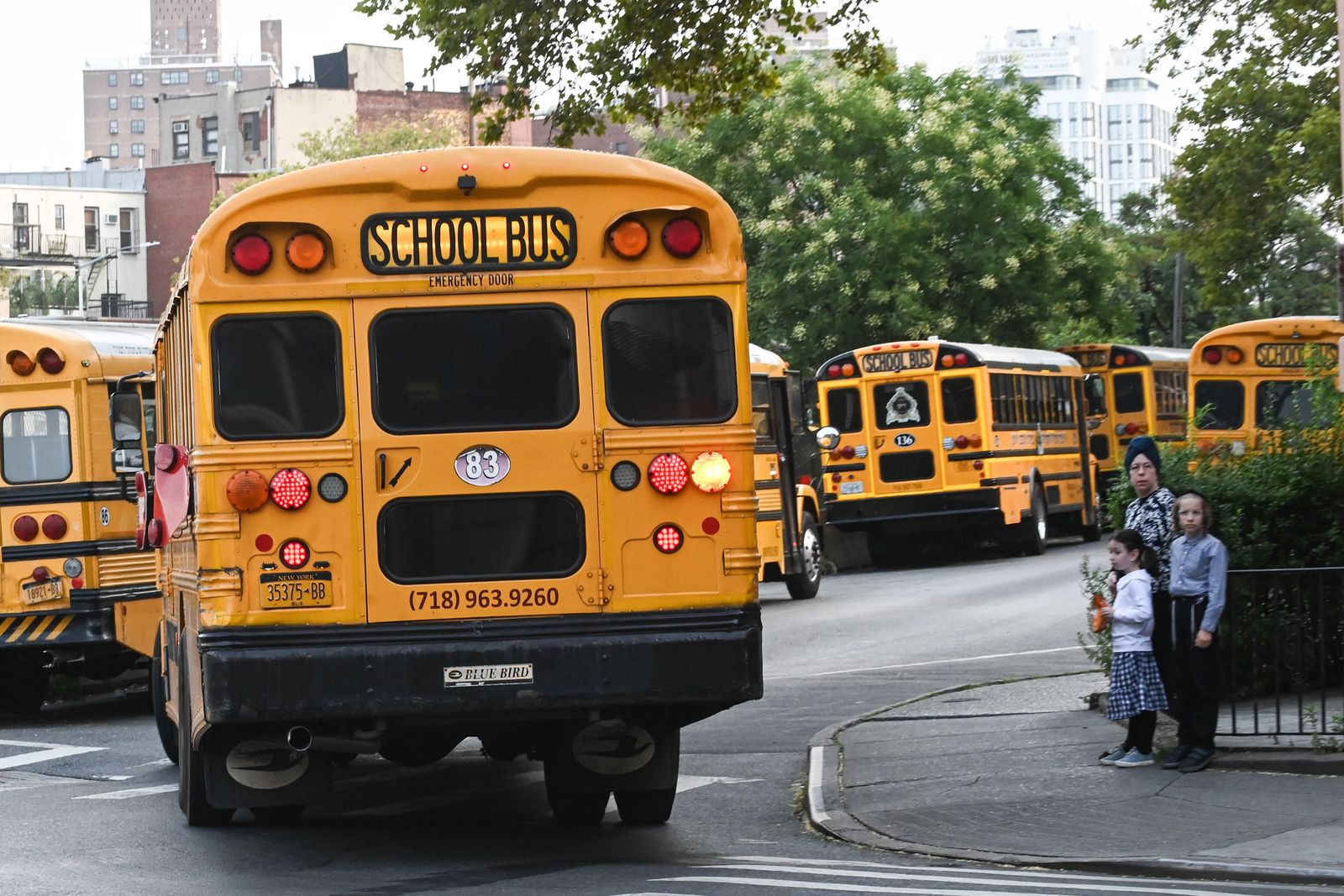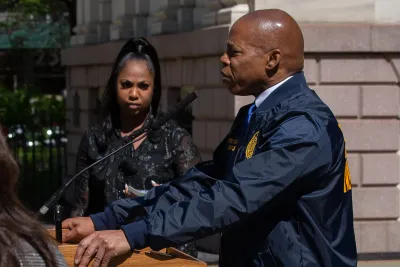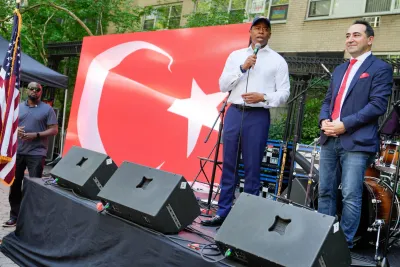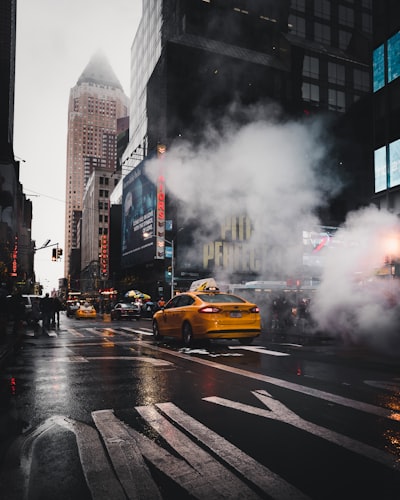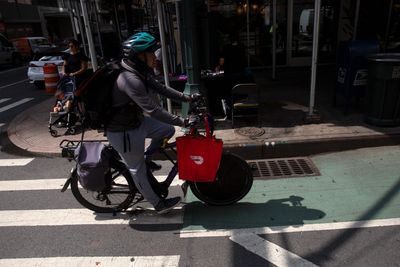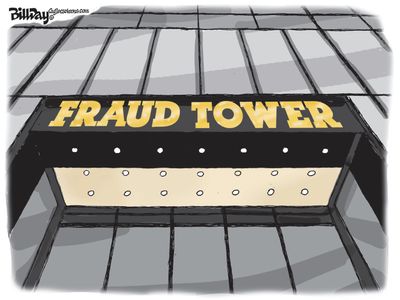Letters obtained by THE CITY via lawsuit show the Department of Education concluded as early as 2018 that some religious schools stinted on secular education but didn’t intervene. Those four schools still fail to meet the bar, the city recently determined.
Yoav Gonen, The City
This article was originally published on Aug 7 5:00am EDT by THE CITY

Records released by the city Department of Education after a years-long legal fight with THE CITY show city officials knew as early as 2018 that some religious Jewish schools were failing to provide the minimum required standard of secular instruction to their students — but refrained from intervention.
The four schools, all labeled “underdeveloped,” the lowest possible score, were among more than two dozen yeshivas that the DOE investigated in response to a July 2015 complaint filed by advocates alleging that students weren’t getting meaningful lessons in subjects that included English and math.
The education department released its findings in late June for 11 of the yeshivas investigated, while forwarding recommendations — all with negative findings — on 14 other religious schools that are supervised by the New York State Education Department. (The DOE had previously ruled in 2019 that two other yeshivas were meeting state requirements.)
Of the 11 schools under the DOE’s purview, seven got clean bills of health in the recently released reviews — most of them after one site visit. But four schools that the city DOE had flagged for significant issues in 2018 and 2019 were once again marked by the DOE in June 2023 as falling short of the state requirement that they provide an education that’s “substantially equivalent” to that of public schools, as required by state regulations.
The four Brooklyn schools marked as “underdeveloped” for secular instruction in the letters newly obtained by THE CITY include Yeshiva Kerem Shlomo in Borough Park and Yeshiva Bnei Shimon Yisroel of Sopron in Williamsburg. At both those schools, DOE investigators only observed classes in Jewish studies and conducted in Yiddish during classroom visits in May 2019, the letters indicate.
State regulations require the core subjects of English Language Arts, math, science and social studies to be taught in English.
The other two schools the DOE flagged as substandard in 2019 are Yeshiva Ohr Menachem and Yeshiva Oholei Torah in Crown Heights.
The documents and the DOE’s investigative findings from late June describe few steps taken by the department over the years to ensure that the four lagging schools were working toward compliance — even as two of those yeshivas disengaged entirely from the review.
Advocates have accused the administration of former Mayor Bill de Blasio of slow-walking the investigations because of his tight political relationship with the Hasidic community, which goes back to his days as a City Council member in Brooklyn whose district included the Orthodox group’s stronghold of Borough Park.
Under a mandate from the State Education Department, the administration of Mayor Eric Adams, who has also enjoyed a good relationship with the Hasidic community, closed the probes within 18 months of taking office.
He has said multiple times that he supports the positive results of yeshiva education, and even said in May that public schools should emulate what he called their “success.”
/cdn.vox-cdn.com/uploads/chorus_asset/file/24830597/080423_YeshivaSchools01.jpg)
Pedestrians walk by a Williamsburg industrial building housing Yeshiva Bnei Shimon Yisroel. | Marcus Santos/THE CITY
Beatrice Weber, a former yeshiva parent who is executive director of the advocacy group Yaffed, which filed the original complaint, said one of the problems with the procedure for overseeing religious schools is that it focuses almost exclusively on systemic change, with no mechanism for catching up kids who have already been left behind.
She noted that kids who were 10 when Yaffed filed its complaint in 2015 are now turning 18.
“We need remediation as part of the process,” said Weber, whose group filed a notice with the State Education Department asking the commissioner to compel school districts to help affected yeshiva students catch up on their education. “You can’t just identify a school as not ‘substantially equivalent’ and then just say. ‘OK, we’ll give you a year or two to fix it,’” she added. “What do you do with those kids in the meanwhile?”
The process outlined in state regulations gives out-of-compliance schools 60 days to work with the DOE to create a plan and a timeline for meeting the mandates. That time period can be as long as two years, and can be extended at the discretion of the state education commissioner.
Asked about the drawn-out pace of the investigations, city Department of Education spokesperson Nathaniel Styer referred to an earlier statement that was released with the findings on June 30.
“For any school found to not be substantially equivalent, according to the strict State law and regulations, the DOE stands ready to support the school to becoming substantially equivalent,” he said at the time. “As always, our goal is to build trust, work with the community, and ensure schools are in compliance with state education law and regulations.”
Slow, Not Steady
Signs emerged early that the de Blasio administration’s probe of yeshivas would be a slow-going affair: It took DOE officials more than three years to conduct the first classroom visits at the four schools.
At Yeshiva Ohr Menachem and Yeshiva Oholei Torah in Crown Heights, school administrators told the reviewers on Nov. 20, 2018, that students learn the core subjects — English Language Arts, science, math and social studies — through their studies of Jewish texts.
That same day, DOE reviewers witnessed lessons solely on Jewish laws and rules at Ohr Menachem, and primarily on the same at Oholei Torah, along with one math class on division.
The investigators didn’t return to either school until April and May of this year — more than four years later — when they found the instruction at each school essentially unchanged.
This was after administrators at Ohr Menachem submitted minimal documentary evidence over the years of what they taught, providing no lesson plans, curriculum maps, assessment results or examples of student work. Oholei Torah similarly provided no lesson plans, curriculum maps or assessment results.
Officials at the two schools didn’t respond to emails from THE CITY seeking comment.
At the two schools where investigators saw instruction only in Yiddish in May 2019, the DOE waited until November 2020 — in part because of the coronavirus pandemic — before requesting proof that the schools were implementing instruction in English in the core subjects. Neither school responded to the DOE.
Investigators waited another year, until November 2021, before requesting a follow-up visit at Yeshiva Bnei Shimon Yisroel of Sopron. A school administrator responded the following month to say pending changes to state regulations made a visit “premature.”
While those amendments were approved by the State Education Department in September 2022, DOE investigators didn’t request another school visit until December 2022.
A yeshiva official wrote back in February 2023 to say, “It is not clear to us what additional information you would gain by again visiting our school.”
Reps for the other school with Yiddish-only instruction, Yeshiva Kerem Shlomo, told the DOE in Dec. 2020 that the school had closed — without providing sufficient proof, according to the DOE’s findings.
The findings say the DOE called and emailed school administrators several times seeking more evidence of a school closure, but got no response.
There’s no mention of an attempt by investigators to visit the site at any point after December 2020.
It wasn’t until recent weeks that the DOE made and publicly shared its determination that both schools were failing to meet the state’s “substantially equivalent” mark.
The DOE said it was up to Kerem Shlomo to prove it had closed, while the State Education Department said it was the DOE’s responsibility to determine the list of nonpublic schools within its boundaries.
A State Education Department spokesperson said the state believes that the school has closed.
Legal Action
On June 30, roughly an hour before the results of the DOE investigation on the 11 schools were made public, Adams and two City Hall aides held a video call with two dozen Jewish community and educational leaders.
The message from the mayor: Don’t blame him, according to three people familiar with the call.
They said the mayor made it clear the State Education Department was in charge of the nonpublic school review process, and that the city’s hands were tied in having to abide by the strict rules.
De Blasio also often put the onus on the state, while investigations by his own education department proceeded for more than six years without resolution.
“If I could have given the order Day One — whatever you’re doing, you must do this tomorrow — I would have done that,” he told WNYC in December 2019. “It’s not how it works, and the real control is by the state and we have to work with their ground rules.” (A State Education Department spokesperson noted that the regulations are governed by state law.)
Yet the city’s Department of Investigation found that same month that political factors had in fact played a role in the slow pace of the probes. The report cited disputes between the DOE and an attorney representing the yeshivas over gaining access to classrooms and documents and “the collaborative approach taken by the DOE to those disputes” as a significant factor in the delays.
Both mayors also fought the release of the 2019 investigative findings, which were detailed in letters sent by former schools chancellor Richard Carranza to each school, after THE CITY filed a Freedom of Information Law request and, subsequently, sued to obtain the letters in April 2021.
This past June, a state judge ordered the DOE to provide all two dozen letters to THE CITY, but the Adams administration has since acted to appeal the ruling.
The DOE recently provided 11 of the letters from 2019, but only after releasing the final results of the probes of those schools.
City officials are still fighting the release of 14 of the letters from 2019, which correspond to the 14 yeshivas the DOE forwarded to the state for final determination, with negative findings..
State Education Department officials declined to provide a date by which its determinations will be made.
Despite the attempts by two administrations to keep the earlier findings under wraps, a number of the 11 letters obtained by THE CITY through the lawsuit highlight examples of yeshivas that have been performing well.
Carranza told four of the yeshivas in 2019 that they were “well-developed” — the highest rating — and the DOE identified all four in June as meeting the “substantially equivalent” mark.
At Yeshiva Karlin Stolin in Borough Park in May 2017, DOE investigators documented a seventh-grade geography class where students participated in a competition to find countries on a map — and during which the teacher asked questions that included, “What is an archipelago?”
At United Lubavitcher Yeshivoth in Midwood, DOE officials observed a second-grade English Language Arts class where 17 students learned about the words “liberty” and “freedom” using a McGraw Hill textbook called “Reading Wonders.”
And at Yeshiva Chasan Sofer in Borough Park, the investigators saw a third-grade teacher posing multiplication and division word problems to his students, who demonstrated the answers on their fingers as they responded.
New Wrinkles
Last month, only after the DOE’s findings were made public, the state Education Department released further guidelines for its “substantial equivalency” determinations.
One issue that’s addressed is the argument by some schools — including Ohr Menachem and Oholei Torah — that their students learn the core subjects such as history and math through their in-depth study of religious texts.
The new state standard makes clear that secular education taught through the lens of religious instruction can be considered in a school’s overall scoreboard for substantial equivalency.
“A nonpublic school may choose whether to integrate required instruction into religious classes either in whole or part for purposes of consideration by the” reviewing entity, the guidelines state.
Rich Bamberger, a spokesperson for the yeshiva advocacy group PEARLS, said the guidance affirms what the observant religious community has long believed.
“PEARLS wholeheartedly agrees that the religious studies classes in yeshivas offer a challenging and rewarding intellectual experience that is surely relevant to any fair and complete assessment of yeshiva education,” he said.
David Bloomfield, an education professor at Brooklyn College and The CUNY Graduate Center, called the new guidance “ambiguous,” and a continuation of the state Education Department’s efforts to move the goalposts and make it “more difficult to hold these yeshivas and whatever other private schools that may not be in compliance into account.”
He said the fundamental problem with the whole process is the lack of urgency.
He cited the example of special education federal law, which requires students referred for services be placed within 60 days, as a recognition that every day without a proper education matters.
“Here, we’re giving schools years to ignore that essential right,” said Bloomfield. “Under these regulations, a child can go their entire elementary and middle school career attending a noncompliant ‘school’ that doesn’t meet requirements.”
Last October, PEARLS filed a lawsuit challenging a number of measures included in the state’s changes to its overview of private schools, and in March, a state court agreed with the group on two significant issues.
The ruling said SED can’t require schools that don’t meet state regulations to close and can’t require parents to pull their kids from those schools either — two of the few policies with teeth in the state’s oversight process.
The State Education Department has since moved to appeal.
THE CITY is an independent, nonprofit news outlet dedicated to hard-hitting reporting that serves the people of New York.
